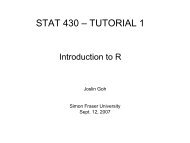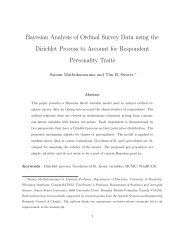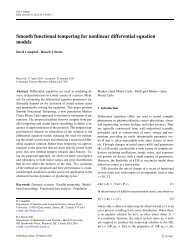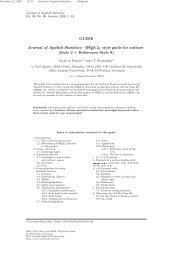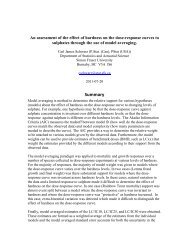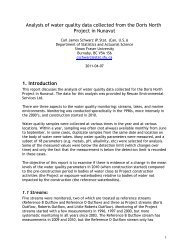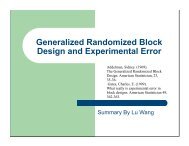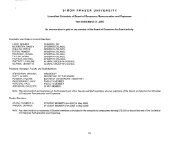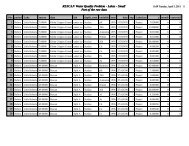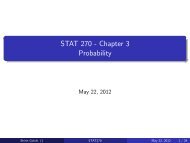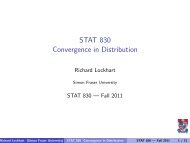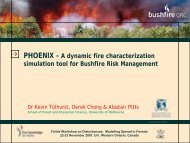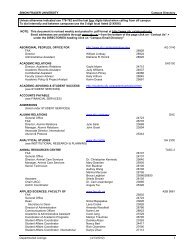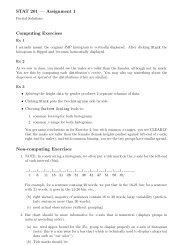Stat-403/Stat-650 : Intermediate Sampling and Experimental Design ...
Stat-403/Stat-650 : Intermediate Sampling and Experimental Design ...
Stat-403/Stat-650 : Intermediate Sampling and Experimental Design ...
You also want an ePaper? Increase the reach of your titles
YUMPU automatically turns print PDFs into web optimized ePapers that Google loves.
<strong>Stat</strong>istical Significance TestingIn contrast, the hypotheses usually tested by wildlife ecologists do not devolve from general theoriesabout how the real world operates. More typically they are statistical hypotheses (i.e., statements aboutproperties of populations; Simberloff 1990). Unlike scientific hypotheses, the truth of which is truly inquestion, most statistical hypotheses are known a priori to be false. The confusion of the 2 types ofhypotheses has been attributed to the pervasive influence of R. A. Fisher, who did not distinguish them(Schmidt <strong>and</strong> Hunter 1997).Scientific hypothesis testing dates back at least to the 17th century: in 1620, Francis Bacon discussed therole of proposing alternative explanations <strong>and</strong> conducting explicit tests to distinguish between them asthe most direct route to scientific underst<strong>and</strong>ing (Quinn <strong>and</strong> Dunham 1983). This concept is related toPopperian inference, which seeks to develop <strong>and</strong> test hypotheses that can clearly be falsified (Popper1959), because a falsified hypothesis provides greater advance in underst<strong>and</strong>ing than does a hypothesisthat is supported. Also similar is Platt's (1964) notion of strong inference, which emphasizes developingalternative hypotheses that lead to different predictions. In such a case, results inconsistent withpredictions from a hypothesis cast doubt of its validity.Examples of scientific hypotheses, which were considered credible, include Copernicus' notion H A : theEarth revolves around the sun, versus the conventional wisdom of the time H 0 : the sun revolves aroundthe Earth. Another example is Fermat's last theorem, which states that for integers n, X, Y, <strong>and</strong> Z, X n + Y n= Z n implies n < 2. Alternatively, a physicist may make specific predictions about a parameter based on atheory, <strong>and</strong> the theory is provisionally accepted only if the outcomes are within measurement error of thepredicted value, <strong>and</strong> no other theories make predictions that also fall within that range (Mulaik et al.1997). Contrast these hypotheses, which involve phenomena in nature, with the statistical hypothesespresented in The Journal of Wildlife Management, which were mentioned above, <strong>and</strong> which involveproperties of populations.Rejection of a statistical hypothesis would constitute a piece of evidence to be considered in decidingwhether or not to reject a scientific hypothesis (Simberloff 1990). For example, a scientific hypothesismight state that clutch sizes of birds increase with the age of the bird, up to some plateau. That ideawould generate a hypothesis that could be tested statistically within a particular population of birds. Asingle such test, regardless of its P-value, would little affect the credibility of the scientific hypothesis,which is far more general. A related distinction is that scientific hypotheses are global, applying to all ofnature, while statistical hypotheses are local, applying to particular systems (Simberloff 1990).Why do we wildlife ecologists rarely test scientific hypotheses? My view is that we are dealing withsystems more complex than those faced by physicists. A saying in ecology is that everything isconnected to everything else. (In psychology, "everything correlates with everything," giving rise to whatDavid Lykken called the "crud factor" for such ambient correlation noise [Meehl 1997]). This sayingimplies that all variables in an ecological system are intercorrelated, <strong>and</strong> that any null hypothesispostulating no effect of a variable on another will in fact be false; a statistical test of that hypothesis willbe rejected, as long as the sample is sufficiently large. This line of reasoning does not denigrate the valueof experimentation in real systems; ecologists should seek situations in which variables thought to be73http://www.npwrc.usgs.gov/resource/1999/statsig/whyused.htm (2 of 3) [12/6/2002 3:11:01 PM]



